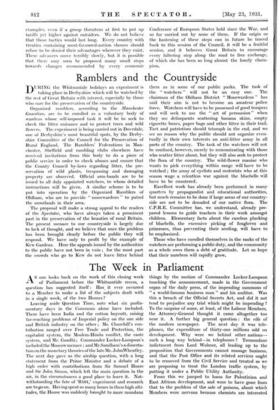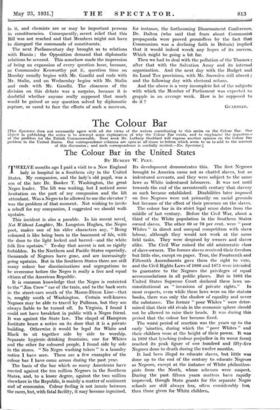The Week in Parliament
AS one looks back on the work of this closing week of Parliament before the Whitsuntide recess, a question • has suggested itself : Has, it ever occurred to a Member to make a list of the subjects dealt with in a single week, of the two Houses ?
Leaving aside 'Question Time, note what six parlia- mentary days in the Commons alone have included. There have been India and the cotton boycott, raising far-reaching problems of Imperial policy on the one side and British industry on the other ; Mr. Churchill's con- tribution ranged over Free Trade and Protection, the capitalist system, the Moslem-Hindu conflict,. the caste system, and Mr. Gandhi; Commander Locker-Lampson's included the Moscow menace; and Mr.Sandham's a disserta- tion on the monetary theories of the late Mr. JohnWheatley. The next day gave us the airship question, with a long statement from the Prime Minister and a debate of a high order with contributions from Sir . Samuel . Hoare and Sir John Simon, which left the main question in the air, in the circumstances a good place to leave it. Not- withstanding the fate of 'RM.,' experiment and research are to goon. Having spent so many hours in these high alti- tudes, the House was suddenly brought to more mundane things by the motion of Commander Locker-Lampson touching the announcement, made in the. Government organ of the daily press, of the impending summons of " a world-famous business man " and his auditor. Was this a breach of the Official Secrets Act, and did it not tend to prejudice any trial which might be impending ? To the surprise of some, at least, of the Labour Members, the Attorney-General thought it came altogether too near it. A further big general question : the role of the modern newspaper. The next day it was tele- phones, the expenditure of thirty-one millions odd on development. Why were we behind other nations— such a long way behind—in telephones ? Tremendous indictment from Lord Wolmer, all leading up to the proposition that Governments cannot manage business, and that the Post Office and its related services ought to be removed from the Civil. Service and treated as we are proposing to treat the London traffic system, by putting it under a Public Utility Authority.
From this we . jumped to loans for Palestinian and East African development, and were to have gone from that to the problem of the sale of poisons, about which Members were nervous because chemists are interested in it, and chemists are or may be important persons in constituencies. Consequently, secret relief that this Bill was not reached and that Members might not have to disregard the commands of constituents.
The next Parliamentary day brought us to relations with Russia ; the Opposition demand that diplomatic relations be severed. This somehow made the impression of being an expansion of every question hour, because, as Commander Kenworthy put it, question time on Monday usually begins with Mr. Gandhi and ends with Mr. Stalin, and on Wednesday begins with Mr. Stalin and ends with Mr. Gandhi. The closeness of the division on this debate was' a surprise, because it is doubtful whether anyone really supposed that much would be gained or any question solved by diplomatic rupture, or cared to face the effects of such a move on, for instance, the forthcoming Disarmament Conference. Dr. Dalton (who said that fears about Communist propaganda were proved groundless by the fact that Communism was a declining faith in Britain) implied that it would indeed wreck any hopes of its success. Which might be going a bit far.
Then we had to deal with the pollution of the Thames ; after that with the Salvation Army and its internal organization. And the next day with the Budget and its Land Tax provisions, with Mr. Snowden still absent ; and the following day with electoral reform.
And the above is a very incomplete list of the subjects with which the Member of Parliament was expected to grapple in an average week. How is he supposed to do it ?
GUARDIAN.







































 Previous page
Previous page